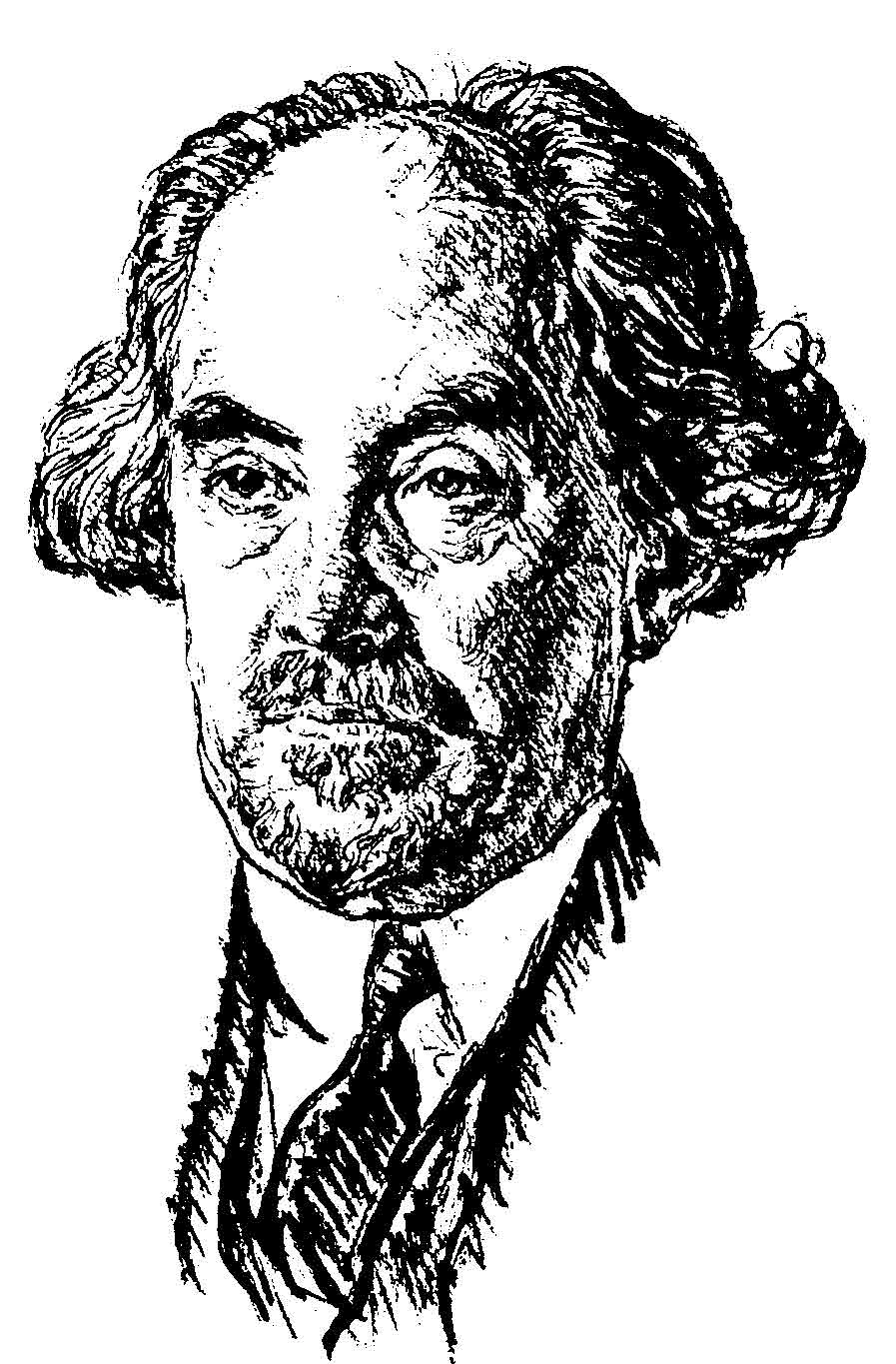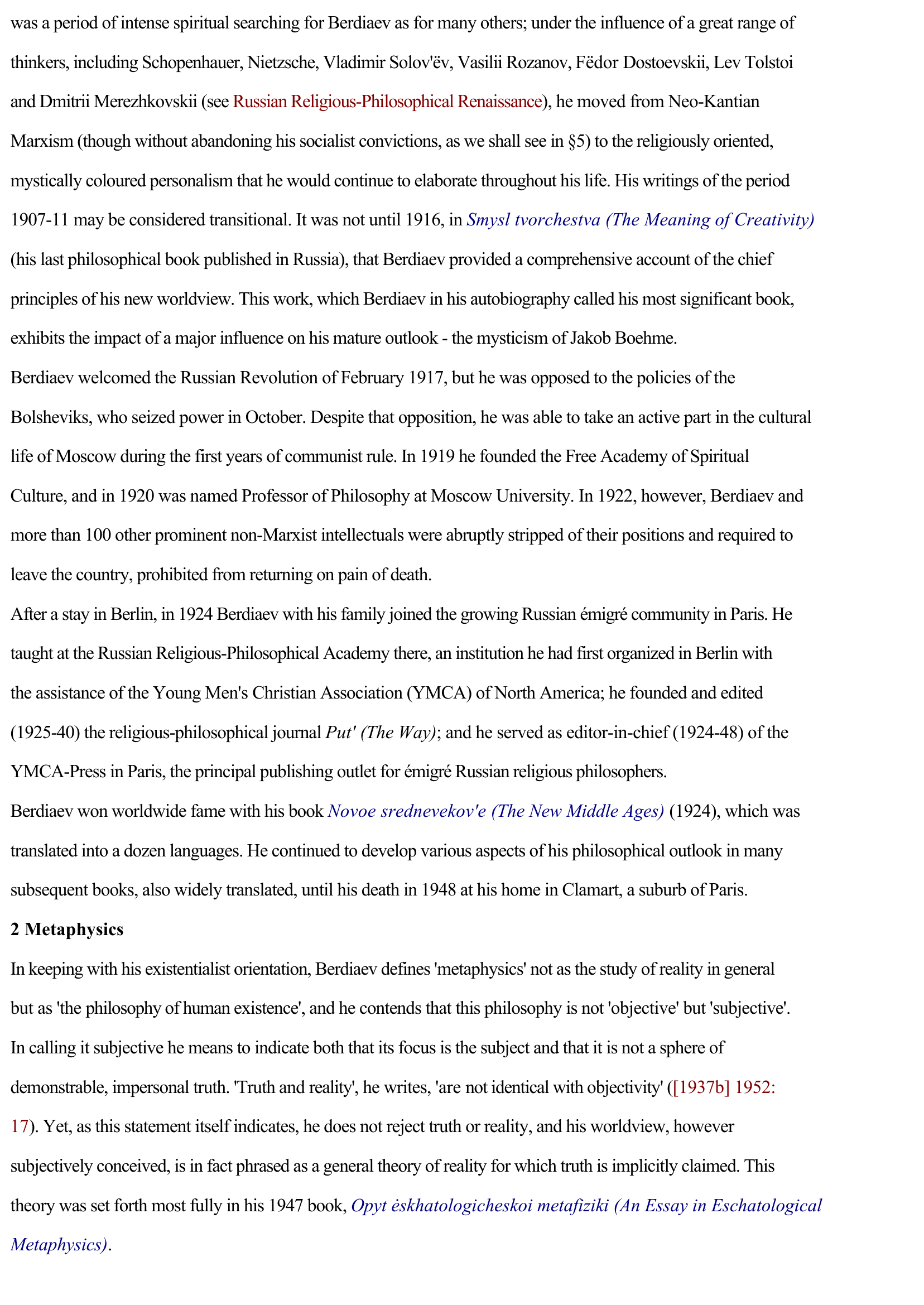Berdiaev, Nikolai Aleksandrovich
Publié le 22/02/2012

Extrait du document


«
was a period of intense spiritual searching for Berdiaev as for many others; under the influence of a great range of
thinkers, including Schopenhauer, Nietzsche, Vladimir Solov'ëv , Vasilii Rozanov, Fëdor Dostoevskii, Lev Tolstoi
and Dmitrii Merezhkovskii (see Russian Religious-Philosophical Renaissance ), he moved from Neo-Kantian
Marxism (though without abandoning his socialist convictions, as we shall see in §5) to the religiously oriented,
mystically coloured personalism that he would continue to elaborate throughout his life.
His writings of the period
1907-11 may be considered transitional.
It was not until 1916, in Smysl tvorchestva (The Meaning of Creativity)
(his last philosophical book published in Russia), that Berdiaev provided a comprehensive account of the chief
principles of his new worldview.
This work, which Berdiaev in his autobiography called his most significant book,
exhibits the impact of a major influence on his mature outlook - the mysticism of Jakob Boehme.
Berdiaev welcomed the Russian Revolution of February 1917, but he was opposed to the policies of the
Bolsheviks, who seized power in October.
Despite that opposition, he was able to take an active part in the cultural
life of Moscow during the first years of communist rule.
In 1919 he founded the Free Academy of Spiritual
Culture, and in 1920 was named Professor of Philosophy at Moscow University.
In 1922, however, Berdiaev and
more than 100 other prominent non-Marxist intellectuals were abruptly stripped of their positions and required to
leave the country, prohibited from returning on pain of death.
After a stay in Berlin, in 1924 Berdiaev with his family joined the growing Russian émigré community in Paris.
He
taught at the Russian Religious-Philosophical Academy there, an institution he had first organized in Berlin with
the assistance of the Young Men's Christian Association (YMCA) of North America; he founded and edited
(1925-40) the religious-philosophical journal Put' (The Way) ; and he served as editor-in-chief (1924-48) of the
YMCA-Press in Paris, the principal publishing outlet for émigré Russian religious philosophers.
Berdiaev won worldwide fame with his book Novoe srednevekov'e (The New Middle Ages) (1924), which was
translated into a dozen languages.
He continued to develop various aspects of his philosophical outlook in many
subsequent books, also widely translated, until his death in 1948 at his home in Clamart, a suburb of Paris.
2 Metaphysics
In keeping with his existentialist orientation, Berdiaev defines 'metaphysics' not as the study of reality in general
but as 'the philosophy of human existence' , and he contends that this philosophy is not 'objective' but 'subjective' .
In calling it subjective he means to indicate both that its focus is the subject and that it is not a sphere of
demonstrable, impersonal truth.
'Truth and reality' , he writes, 'are not identical with objectivity' ([1937b] 1952:
17).
Yet, as this statement itself indicates, he does not reject truth or reality, and his worldview, however
subjectively conceived, is in fact phrased as a general theory of reality for which truth is implicitly claimed.
This
theory was set forth most fully in his 1947 book, Opyt ėskhatologicheskoi metafiziki (An Essay in Eschatological
Metaphysics) ..
»
↓↓↓ APERÇU DU DOCUMENT ↓↓↓
Liens utiles
- SOURCES ET LE SENS DU COMMUNISME RUSSE (LES), Nikolaï Alexandrovitch Berdiaev (ou Berdiaeff)
- ESPRIT ET REALITE Nicolas Berdiaev (résumé)
- DESTINATION DE L'HOMME (DE LA), Essai d’éthique paradoxale, 1931. Nikolaï Alexandrovitch Berdiaev
- ESPRIT ET RÉALITÉ, Nikolaï Alexandrovitch Berdiaev
- OMBRE D’UN AMI (L’) (Résumé et analyse) Nikolai Semionovitch Tikhonov

































